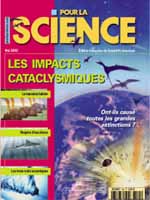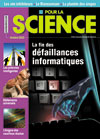- Massimo Piattelli Palmarini. Attenti, i Big Data non sono la scienza,
Corriere della Sera, 19 June 2016, presents the mathematical analysis of Big Data in
C. S. Calude and G. Longo, The deluge of spurious correlations in big data,
Foundations of Science (2016).
- G. Smith. More on Big Data, Big Trouble, March 2016.

"A daring assault on the very bounds of mathematics could bring back
treasures we thought were forever beyond our reach. Get ready to know
the unknowable", says award-winning writer Marcus Chown,
author of
The Universe Next Door in the cover story
Smash and grab
of the April 6, 2002 issue of the New Scientist. "Calude and Pavlov
point out that an atom like hydrogen has an infinite number of possible states, each with a different
level of energy. ... Calude and Pavlov's method
could only produce a probability of whether or not Goldback's conjecture ... is true ... But that's one
step better than the current position where there is no probability attached to the out come.
Here, at least in principle, is a real result dependent on a 'real' infinity. Cf. B. Clegg.
Infinity.
The Quest to Think the Unthinkable, Robinson, London, 2003, p. 234. See more in
Algorithmic Randomness, Quantum Physics, and Incompleteness,
Martin Ziegler's course at the University of Paderborn:
Hypercomputation,
Ziegler's
Does Quantum Mechanics Allow for Infinite Parallelism?
and Akl's The Myth of Universal Computation.
 "... connaître les chiffres d'une machine universelle U à
programmes autodélimités précise qui n'a pas été
construite de manière adéquate pour avoir des chiffres connus à
l'avance est rèellement une tâche difficile, car ΩU
contient alors sous forme concentrée l'information sur l'arrêt
des programmes de U. Peut-on tenter de calculer quelques chiffres d'un
tel ΩU? Oui et c'est ce qu'ont fait récemment C.
Calude, M.J. Dinneen et C.K. Shu." For details see the paper Les Nombres
Oméga by Jean-Paul
Delahaye, author of the book Information, complexité
et hasard, in the 295 issue of the French edition of Scientific
American Pour La Science
(May 2002)
"... connaître les chiffres d'une machine universelle U à
programmes autodélimités précise qui n'a pas été
construite de manière adéquate pour avoir des chiffres connus à
l'avance est rèellement une tâche difficile, car ΩU
contient alors sous forme concentrée l'information sur l'arrêt
des programmes de U. Peut-on tenter de calculer quelques chiffres d'un
tel ΩU? Oui et c'est ce qu'ont fait récemment C.
Calude, M.J. Dinneen et C.K. Shu." For details see the paper Les Nombres
Oméga by Jean-Paul
Delahaye, author of the book Information, complexité
et hasard, in the 295 issue of the French edition of Scientific
American Pour La Science
(May 2002)

"Contrairement à ce que les mathématiciens ont pensé - sans doute par souci
d'indépendance et parce qu'ils croient que leur science est reine - le calcul est
une affaire physique. C'est à la relativité générale et à la mécanique
quantique de
déterminer ce qui est possible dans le domaine de la manipulation
et du traitement de l'information..." For details see the paper La barrièere de Turing
by Jean-Paul
Delahaye in the 312 issue of the French edition of Scientific
American Pour La Science
(October 2003)
- Poem on Ω by Robert M. Chute
provoked by the paper C. S. Calude, G. J. Chaitin. Randomness everywhere, Nature, 400, 22 July (1999),
319-320.
Source: Beloit Poetry Journal
Spring 2000,
Vol. 50, No. 3, p. 8.
- "When there is no doubt about a piece of research,
the results are not revolutionary. But in an area where there is doubt, they
create both scepticism and excitement" says
Greg Chaitin in a joint interview with Cris Calude given to
Judy Wilford:
Computing the Incomputable,
University of Auckland News,
vol. 32, issues 7, August (2002) p. 9
- G. J. Chaitin and C. S. Calude paper
Mathematics / Randomness everywhere Nature
vol 400, 22 July 1999, 319-320 was announced by AMS in October 1999.
- J. Borwein, P. Borwein, R. Girgensohn and S. Parnes.
Experimental Mathematics: A Discussion
- NZ
Herald presentation
- InfoTech Weekly:
Scientists Ponder Future of Computers (click
on January 1998 news)
- Jean-Paul Delahaye.
Demontrer ? Pour la Science
January 2004.
-
Steven Finch.
Well-known Constants: Chaitin Constant.
Errata and Addenda
- Gianpietro Malescio. Predicting
with unpredictability
Nature 434, 1073 (28 April 2005), 1034.
-
J. Resag.
Unvollstandigkeit und Zufall in der Mathematik
-
Simon Collins' NZ Herald article
Scotty may soon be able to beam us up, Saturday, 24.07.2004;
here is a printable version. In Romanian by Catalin Mosoia
from Radio Europa FM
- In Polish, Jerzy Mycka. Omne sacramentum non est impossibile tibi
- Some ideas and open problems in quantum randomness are cited at id Quantique and in K. Klotz. Zahlen, wie noch keine
waren---Die muhsame Suche nach dem echten Zufall,
Innovate!,
September 2005, 18--21. (Innovate! is a
Quarterly magazine distributed with the
Suddeutsche Zeitung)
- Presque tout est indecidable! par J-P. Delahaye appeared in Pour La Science January 2009
- Arturo Sangalli. Pythagoras' Revenge: A Mathematical Mystery, Princeton University Press, 2009.
(A mystery novel on the philosophy of mathematics)
- The CBS (US drama) TV show Numb3rs (season 5; episode 5; scene 6) cites the Omega number bits computed by
Calude-Dinneen-Shu. For the math behind see scene 6 (LARRY:
Ah, Charles, my ambulatory
reference book. Chaitin's Omega
Constant...? CHARLIE:
Omega equals .00787499699. Why,
what're you working on?
(sees the file, reacts)
Oh. FBI file.)
- Lecture 12: Data Structures and Algorithms - Richard Buckland
: After approximately 11:30 minutes the Bead-Sort is presented and credit is given to its "Australians from Christchurch" authors.


